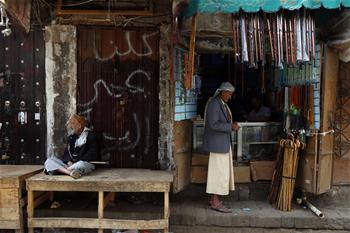By sportswriter Jonathan Dixon
BEIJIING, Aug. 16 (Xinhua) -- This coming Bundesliga season is perhaps the most important of this decade. Seven years in a row. Seven years of total domination of the German top flight by Bayern Munich. If Bayern wins the title again this season, the Bundesliga can give up being taken seriously.
Last season saw a faltering Bayern scrape over the line ahead of rivals Borussia Dortmund in the closest title race in years. Yet, in spite of their poor start and indifferent form before the winter break, a serious run of form, coupled with a slowing Dortmund, meant that the Bavarians were able to finish first.
However, under the competitiveness of the Bundesliga from the decade before when five teams won the title in eight years, this stuttering form would be punished in more competitive circumstances.
For all their brilliance over the past seven seasons, the domination of one club in Germany is beginning to hurt the prospects of German football.
A decline in the competitiveness in Germany has led to the decline of German clubs on the European stage. Bayern has not made a Champions League final since 2013 when they defeated Dortmund in the final, coincidentally the year they last failed to secure the league title. In the years following 2013, Bayern has been the only German club to reach the semifinals, while Dortmund is the only other German side to reach the quarterfinals in the past three seasons.
These issues stem from Bayern's financial power and the draw of success within Germany, with the spending power to draw the likes of Hummels and Gotze from their nearest rivals in Dortmund, while players like Goretzka and Kimmich, for example, have arrived from other big German sides. The result is that any clubs with the players that could challenge the Bavarians simply cannot compete financially and find it increasingly difficult to retain the services of players when Bayern come knocking.
As Bayern have pulled away, the Bundesliga has stopped rivaling the English Premier League or Spain's La Liga but has now begun to resemble the Italian Serie A or the French Ligue 1, where one mega club dominates the league and all the others are left fighting over the scraps.
Last season compounded this decline. Not a single German side made the quarterfinals of the Champions League, as Bayern crashed out in the round-of-16 to Liverpool, while Schalke was on the end of a 10-2 aggregate hiding from Manchester City. An aggregate score of 10-2 against a top-four German side would have been unheard of a decade ago.
Increasingly the Bundesliga has become a finishing school for talented European youngsters. The arrival of good young players from the Premier League such as Jadon Sancho and Ademola Lookman are seen temporary deals, where these players are only in the Bundesliga until they gain enough experience to return home to the Premier League.
For this decline to stop, Dortmund will have to take their chance this season. The stunted growth of Leipzig and the inconsistencies of the other 'big' sides have left the Bundesliga a two-horse race again. However, with a Bayern squad in transition and a Dortmund side with several new stars, the opportunity for Dortmund in years, as well as for the Bundesliga.
Bayern winning the league while undergoing a significant transition and with arguably their weakest squad this decade will signify the end of the competition in the Bundesliga, at least until Bayern find themselves transitioning again.
If Dortmund wins on the other hand, then perhaps it could provide the spark and impetus to usher in a new era of the Bundesliga, defined by competition - not by whether Bayern will slip up.











